#Eugene Debs
Text
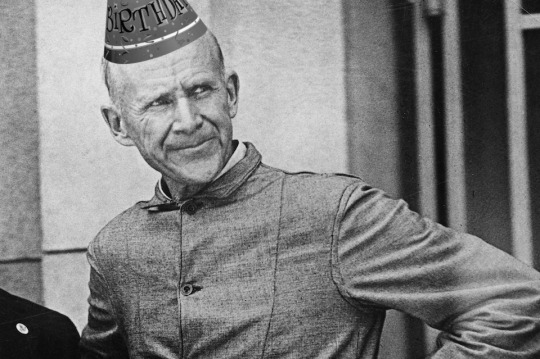
Happy birthday, Eugene Debs! (November 5, 1855)
A highly-influential socialist writer, activist, and politician, as well as a founder of the Industrial Workers of the World, Eugene Debs was born in Terre Haute, Indiana, and was in his younger years a member of the Brotherhood of Locomotive Firemen and an up-and-coming Democratic member of the Indiana House of Representatives. He quit the legislature after a bill to expand workers' rights was gutted, and turned to union organization. He helped to found the American Railway Union, an industrial union of railroad workers, and the union achieved some early success before being crushed in the Pullman Strike, for which Debs was jailed. In prison, Debs read Marx, and emerged a committed socialist and a leading member of the Socialist Party in various of its incarnations. Debs was frequently regarded as the one man who could pull together the party's disparate factions, and was nominated as its candidate for president five times, often against his will. The last of these campaigns, in 1920, was conducted from prison, where Debs had once again been placed after giving a speech condemning the United States' involvement in World War I. Debs' sentence was commuted in 1921 after a large public pressure campaign for his release, but prison time had taken its toll on Debs' health, and he died in 1926.
"Years ago I recognized my kinship with all living beings, and I made up my mind then that I was not one bit better than the meanest on Earth. I said then, and I say now, that while there is a lower class, I am in it; and while there is a criminal element, I am of it; and while there is a soul in prison, I am not free."
168 notes
·
View notes
Photo
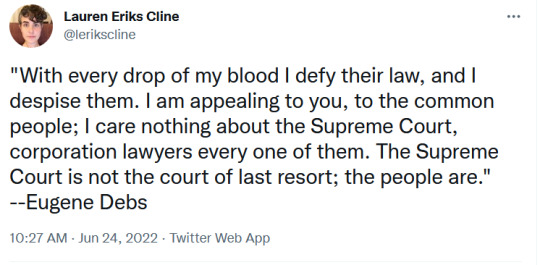
2K notes
·
View notes
Text
Is antitrust anti-labor?
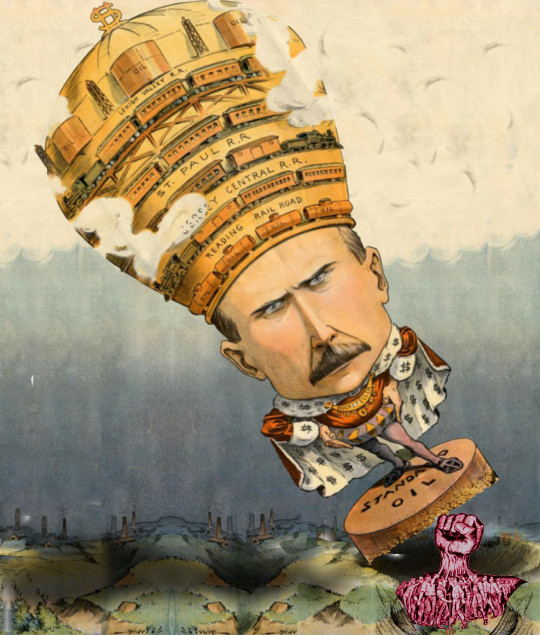
If you find the word “antitrust” has a dusty, old-fashioned feel, that’s only to be expected — after all, the word has its origins in the late 19th century, when the first billionaire was created: John D Rockefeller, who formed a “trust” with his oil industry competitors, through which they all agreed to stop competing with one another so they could concentrate on extracting more from their workers and their customers.
If you’d like an essay-formatted version of this post to read or share, here’s a link to it on pluralistic.net, my surveillance-free, ad-free, tracker-free blog:
https://pluralistic.net/2023/04/14/aiming-at-dollars/#not-men
Trusts were an incredibly successful business structure. A bunch of competing companies would be sold to a new holding company (“the trust”), and the owners of those old standalone companies would get stock in this new trust. The trust would operate as a single entity, hiking prices and suppressing wages. If anyone tried fight the trust with a new, independent company, the trust could freeze them out, by selling goods below cost, or by doing exclusive deals with key suppliers and customers, or both. Once a trust sewed up an industry, no one could compete. The trust barons were rulers for life.
The first successful trust was Rockefeller’s Standard Oil, which amassed a 90% share of all US oil. Other “capitalists” got in on the game, forming the Cotton Seed Oil Trust (75% market share), the Sugar Trust (85%). Then came the Whiskey Trust and the Beef Trust. America was becoming a planned economy, run by a handful of unelected “industrialists” with lifetime appointments and the power to choose their successors.
A century after overthrowing the King, America had new kings: “kings over the production, transportation and sale of the necessities of life”. That’s how Senator John Sherman described the situation in 1890, when he was campaigning for the passage of the Sherman Act, the first “anti-trust” act. The Sherman Act wasn’t the first time American lawmakers tried to protect competition, but it was the first law passed after the failure of competition law led to the hijacking of the nation by people Sherman called the “autocrats of trade.”
https://marker.medium.com/we-should-not-endure-a-king-dfef34628153
The Sherman Act — and its successors, like the Clayton Act, are landmark laws in that they explicitly seek to protect workers and customers from corporate power. Antitrust is about making sure that no corporation gets so powerful that it’s too big to fail, nor too big to jail — that a company can’t get so big that it subverts the political process, capturing its own regulators:
https://doctorow.medium.com/small-government-fd5870a9462e
If American workers are derided as “temporarily embarrassed millionaires” who won’t join the fight against the rich because they assume they’ll soon join their ranks, then the American rich are “temporarily embarrassed aristocrats” who would welcome hereditary rule, provided they got to found one of the noble families. The goal of the American elite has always been to create a vast and durable dynasty, wealth so vast and well-insulated that even the most Habsburg-jawed failson can’t piss it away.
The American elite has always hated antitrust. In the 1980s, Ronald Reagan, abetted by Robert Bork and his co-conspirators at the Chicago School of Economics gutted antitrust through something called the “consumer welfare standard,” which ended anti-monopoly enforcement except in instances where price hikes could be directly and unarguably attributed to market power, which is, basically, never.
It’s been 40 years since Reagan took antitrust out behind the Lincoln Monument and shot it in the guts, and America has turned into the kind of aristocratic kleptocracy that Sherman railed against, where “great families” control the nation’s wealth and politics and even its Supreme Court judges:
https://pluralistic.net/2023/04/06/clarence-thomas/#harlan-crow
Anything that can’t go on forever will eventually stop. Monopoly threatens the living standards, health, freedom and prosperity of nearly every person in America. The undeniable enshittification of the country by its guillotine-ready finance ghouls, tech bros and pharma profiteers has led to a resurgence in antitrust, and a complete renewal of the @FTC and @JusticeATR:
https://www.eff.org/deeplinks/2021/08/party-its-1979-og-antitrust-back-baby
Key to the new and vibrant FTC is Commissioner Alvaro Bedoya, who, along with Commissioner Rebecca SlaughterFTC and Chairwoman Lina Khan, is part of the Democratic majority on the Commission. Bedoya has a background in tech and privacy and civil rights, and is a longtime advocate against predatory finance. He’s also a law professor and a sprightly scholarly writer.
Earlier this week, Bedoya gave a prepared speech for the Utah Project on Antitrust and Consumer Protection conference, entitled “Aiming at Dollars, Not Men.” It’s a banger:
https://www.ftc.gov/system/files/ftc_gov/pdf/bedoya-aiming-dollars-not-men.pdf
Criticisms of the new antitrust don’t just come from America’s oligarchs — the labor movement is skeptical of antitrust as well, and with good cause. Antitrust law prohibits collusion among businesses to raise prices, and at many junctures since the passage of the Sherman Act, judges have willfully perverted antitrust to punish labor organizers, treating workers demanding better working conditions as if they were Rockefeller and his cronies conspiring to raise prices.
This is the subject of Bedoya’s speech, whose transcript is painstakingly footnoted, and whose text makes it crystal clear that this is not what antitrust is for, and we should not tolerate its perversion in service to crushing worker power. The title comes from a 1914 remark by Democratic Congressman Thomas Konop, who said, of antitrust: “We are aiming at the gigantic trusts and combinations of capital and not at
associations of men for the betterment of their condition. We are aiming at the dollars and not at men.”
Konop was arguing for the passage of the Clayton Act, a successor to the Sherman Act, which was passed in part because judges refused to enforce the Sherman Act according to its plain language and its legislative intent, and kept using it against workers. In 1892, two years after the Sherman Act’s passage, it was used to crush the New Orleans General Strike, an interracial uprising against labor exploitation from longshoremen to printers to carpenters to hearse drivers.
Bosses went to a federal judge asking for an injunction against the strike. Though the judge admitted that the Sherman Act was designed to fight “the evils of massed capital,” he still issued the injunction.
The Sherman Act was used to clobber the Pullman Porters union, which organized Black workers who served on the Pullman cars on America’s railroads. The workers struck in 1894, after a 25% wage-cut, and they complained that they could no longer afford to eat and feed their families, so George Pullman fired them all. The workers struck, led by Eugene Debs. Pullman argued that the strike violated the Sherman Act. The Supreme Court voted 9:0 for Pullman, ordered the strike called off, and put Debs in prison.
In 1902, mercury-sickened hatters in Danbury, CT demanded better working conditions — after just a few years on the job, hatters would be disabled for life with mercury poisoning, with such bad tremors they couldn’t even feed themselves. 250 hatters at the DE Loewe company tried to unionize. Loewe sued them under the Sherman Act, and went to the Supreme Court, who awarded Loewe $6.8m in today’s money, which allowed Loewe to seize his former workers’ homes.
This is what sent Congress back to the drawing board to pass the Clayton Act. Though the Sherman Act was clear that it was about trustbusting, the courts kept interpreting it as a charter for union-busting. The Clayton Act explicitly permits workers to form unions, call for boycotts, and to organize sympathy strikes.
They made all this abundantly clear: writing in language so plain that judges had to understand the legislative intent. And yet…judges still managed to misread the Clayton Act, using it to block 2,100 strikes in the 1920s. It appears that passing the Clayton Act did not save a single strike that would have been killed by the bad (and bad faith) Sherman Act precedents that led to the Clayton Act in the first place.
The extent to which greedy bosses used the Clayton Act to attack their workers is genuinely ghastly. Bedoya describes one coal strike, against the Red Jacket Coal Company of Mingo, WV. The mine’s profits had grown by 600%, but workers’ wages weren’t keeping up with inflation. The miners sought a raise of $0.10 on the $0.66 they got paid for ever carload of coal they mined. The company didn’t even pay the workers with real money — just “company scrip”: coupons that could only be spent at the company store. Red Jacket gave its workers a $0.09/car raise — and raised prices at the company store by $0.25/item.
The workers struck, Red Jacket sued. The Fourth Circuit refused to apply the Clayton Act, following a precedent from a case called Duplex Printing that held that the Clayton Act only applied to people who stood “in the proximate relation of employer and employee.”
Congress was pissed. They passed the Norris-LaGuardia Act of 1932, with LaGuardia spitting about judges who “willfully disobeyed the law…emasculating it, taking out the meaning intended by Congress, making the law absolutely destructive of Congress’s intent.” Norris-LaGuardia creates an antitrust exemption for labor that applies “regardless of whether the disputants stand in the proximate relation of employer and employee.” So, basically: “CONGRESS TO JUDGES, GET BENT.”
And yet, judges still found ways to use antitrust as a cudgel to beat up workers. In Columbia River Packers, the court held that fishermen weren’t protected by the exemption for workers, because they were selling “commodities” (e.g. fish) not their labor. Presumably, the fish just leapt into the boats without anyone doing any work.
The willingness of enforcers to misread antitrust continued down through the ages. In 1999, the FTC destroyed the hopes of the some of the country’s most abused workers: “independent” port truckers, who worked 80 hours/week and still couldn’t pay the bills. Truckers were only paid to move trailers around the ports, but they were required to do hours and hours of unpaid work — loading containers, hauling equipment for repair, all for free. The truckers tried to organize a union — and the FTC subpoenaed the organizers for an investigation of price-fixing.
But the problem wasn’t with the laws. It was with judges who set precedents that — as LaGuardia said, “willfully disobeyed the law…emasculating it, taking out the meaning intended by Congress, making the law absolutely destructive of Congress’s intent.”
Congress passed laws to strengthen workers and judges — temporarily embarrassed aristocrats — simply acted as if the law was intended to smash workers. But by 2016, judges had it figured out. That’s when jockeys at the Camarero racetrack in Canóvana, Puerto Rico went on strike, demanding pay parity with their mainland peers — Puerto Rican jockeys got $20 to risk their lives riding, a fifth of what riders on the mainland received.
Predictably, the horse owners and racetrack sued. The jockeys lost in the lower court, and the court ordered the jockeys to pay the owners and the track a million dollars. They even sued the jockeys’ spouses, so that they could go after their paychecks to get that million bucks.
The case went to the First Circuit appeals court and Judge Sandra Lynch said: you know what, it doesn’t matter if the jockeys are employers or contractors. It doesn’t matter if they sell a commodity or their labor. The jockeys have the right to strike, period. That’s what the Clayton Act says. She overturned the lower court and threw out the fines.
As Bedoya says, antitrust is “law written to rein in the oil trust, the sugar trust, the beef trust…the gigantic trusts and combinations of capital…dollars and not at men.” Congress made that plain, “not once, not twice, but three times, each time in a louder and clearer
voice.”
Bedoya, part of the FTC’s Democratic majority, finishes: “Congress has made it clear that worker organizing and collective bargaining are not violations of the antitrust laws. When I vote, when I consider investigations and policy matters, that history will guide me.”

There's only three days left in the Kickstarter campaign for the audiobook of my next novel, a post-cyberpunk anti-finance finance thriller about Silicon Valley scams called Red Team Blues. Amazon's Audible refuses to carry my audiobooks because they're DRM free, but crowdfunding makes them possible.
#pluralistic#jockeys#antitrust#labor#history#judicial overreach#Alvaro Bedoya#consumer welfare standard#trustbusting#sherman act#new orleans general strike of 1892#pullman union#pullman porters#eugene debs#mad hatters#danbury hatters#clayton act#red jacket coal company#Fiorello LaGuardia#Norris-LaGuardia Act#duplex printing#Columbia River Packers#puerto rico#Camarero racetrack
219 notes
·
View notes
Text
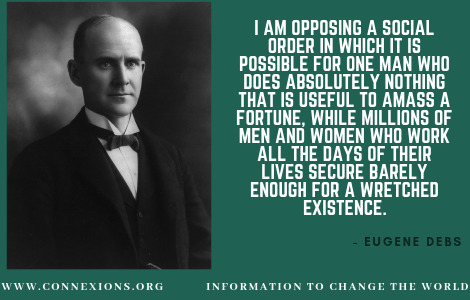
Happy birthday Eugene Debs!
557 notes
·
View notes
Text

Eugene Debs
1920
Runs for President from Atlanta Federal Penitentiary
Socialist Party
914,911 votes
56 notes
·
View notes
Text
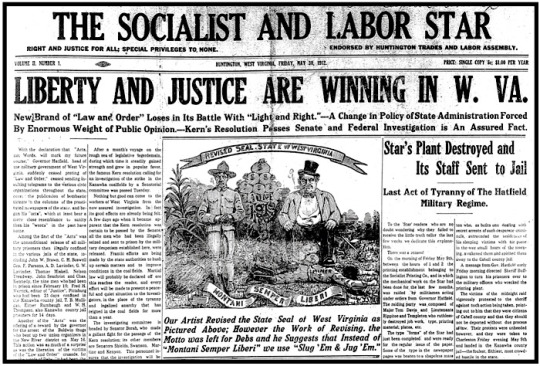
Page from the Socialist and Labor Star, published from 1911 to 1915 from Huntington, WV in the offices of the Socialist Printing Company. Edited without pay by WH Thompson. Ralph Chaplin, writer of Solidarity Forever, was also on the staff, also working without pay.
The Star published commentary on the ongoing Paint Creek-Cabin Creek strike and "bootlegged" literature in the zone where Gov. Hatfield had declared martial law. It was sharply critical of a compromise reached between Gov. Hatfield and UMW officials that had been imposed on the rank and file and did not actually address any of the striker's demands. After an unsuccessful raid on the Socialist Printing Company offices was repelled by armed workers, a second, midnight, raid destroyed or confiscated most of their equipment. Thompson was arrested.
The Star later sued Hatfield, who claimed the raid was necessary as the Star was "inciting to riot." The Supreme Court of WV ruled in favor of the governor, effectively giving him carte blanche to act as he wished in the interest of "public safety," which outraged even Northern bourgeois newspapers.
Meanwhile, local Socialists prevailed on the national party to send a committee to investigate labor & strike conditions in WV. The committee consisted of Eugene Debs, conservative Wisconsin socialist Congressman Victor Berger, and UMW official Adolph Germer. The committee was to investigate conditions and prepare a report for party members.
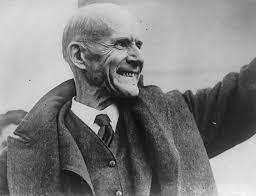


Gov. Hatfield refused to meet with the entire committee, but met with Debs, who caused a scandal by endorsing Hatfield's policies. The report read: "We freely admit having given Gov. Hatfield the credit he is justly entitled to... we insist he shall not be held accountable for the crimes committed under the administration of his servile predecessor." Debs apparently mistakenly believed some of Hatfield's more outrageous acts were committed under the administration of his predecessor, William Glasscock (who Mother Jones insisted on calling "Crystal Peter," for "modesty's sake").
The Star was outraged, saying the committee had been poorly selected, calling Debs a "sentimentalist," Berger a "compromising vote hunter," and Germer "an official of the UMW." According to Thompson, the committee had been misled by the same UMW officials who had imposed Hatfield's settlement on the rank and file. He called the report, with it's "glaring misstatements" "very hurtful to the cause of the struggling worker in the State." Thompson concluded by saying the report had only served to exempt Hatfield and the UMW officials from their role in threatening, coercing, and imprisoning the miners into returning to work.
The protracted feud between Debs and the Star reached national attention, but Debs evaded the Star's attack by blaming the Industrial Workers of the World, stating that Wobbly philosophy was to blame and that WV socialists were against the committee and the settlement "because a contract had been signed." The IWW was apparently a favorite whipping-boy for Debs in those days, who maintained he was an "industrial unionist, but not an industrial bummery-ite." Debs accused the IWW of trying to drive out the UMW.
There is little evidence to back up these claims. The Star, in spite of Ralph Chaplin's involvement, was not an IWW paper, and even Chaplin was not officially a Wobbly at the time. The Star continued to attack the report for exonerating Gov. Hatfield, and the settlement for being imposed on the rank and file and turning a "victory into a compromise." The miners struck again a year later, this time achieving what Thompson considered a victory.
The Star eventually merged with another socialist paper, The Labor Argus. The Argus Star, like many other radical papers, was suppressed after the US's entry into WW1.
7 notes
·
View notes
Text
The Pullman Strike of 1894, led by the American Railway Union, was one of the greatest strikes in American history. Workers were protesting layoffs, low wages, and the high cost of rent in company towns, and it spanned across more than half the states. It was the first time the federal government intervened and (literally) stomped out a strike by sending 10,000 federal troops, and legislation was enacted to make it harder for strikes to occur in big industries like this going forward. But because capitalists doubled down the way they did, it essentially kickstarted the modern American labor movement, which, as we know, led to historical improvements in the workforce. It directly led to Labor Day becoming a federal holiday. And Eugene Debs, who had led the strike, would go on to win nearly a million votes when running for president in prison on the Socialist Party ticket.
#eugene debs#eugene v. debs#pullman strike#railway#railway workers#strike#history#leftist#radical#socialist#communist#capitalist#capitalism#revolt#revolution#reform#union#working class#rent#living wage#labor day#American history
76 notes
·
View notes
Text
xkcd Bracket




Jenny McCarthy. Model, actress, and anti-vaxxer
Joseph McCarthy. American Senator known for anti-communist policies.
Eugene McCarthy. Democratic Minnesota senator and presidential candidate.
Eugene V. Debs. American socialist and trade unionist.
#xkcd#polls#poll tournament#tournmanet#bracket#polls on tumblr#1529#Jenny McCarthy#Joseph McCarthy#0xav0x50#Eugene McCarthy#Eugene Debs#1529 Round 1
11 notes
·
View notes
Quote
I still quote Eugene Debs (1855-1926), late of Terre Haute, Indiana, five times the Socialist Party’s candidate for President, in every speech:
“While there is a lower class I am in it, while there is a criminal element I am of it; while there is a soul in prison, I am not free.”
In recent years, I’ve found it prudent to say before quoting Debs that he is to be taken seriously. Otherwise many in the audience will start to laugh. They are being nice, not mean, knowing I like to be funny.
But it is also a sign of these times that such a moving echo of the Sermon on the Mount can be perceived as outdated, wholly discredited horsecrap.
Which it is not.
Kurt Vonnegut - Timequake
16 notes
·
View notes
Text

Did you know that the "V" in "Eugene V. Debs" stands for Victor? Yes, the parents of political activist Eugene Debs named him after Eugene Sue and Victor Hugo. Les Miserables was apparently his father's bible and it became Eugene's favorite book, which he read over and over again.
The character of Fantine (whom he calls "the greatest character in fiction") inspired him to write the following article, "Fantine In Our Day," in 1916. It was originally published in the International Socialist Review (I came across it in the Brisbane Worker.) In it, Debs examines sex work through the framework of worker's rights and the exploitative nature of labor under capitalism. Some of his arguments are rooted in misogyny, to be sure, but I was surprised by how much the article holds up (in my opinion) and in any case, it's an interesting historical document.
Read it yourself beneath the cut.
Fantine in Our Day by Eugene V Debs
The reader of "Les Miserables" can never forget the ill-starred Fantine, the mournful heroine of Hugo's immortal classic. The very name of Fantine, the gay, guileless, trusting girl, the innocent, betrayed, self-immolating young mother, the despoiled, bedraggled, haunted and holy martyr to motherhood, to the infinite love of her child touches to tears and haunts the memory like a melancholy dream.
Jean Valjean, noblest of heroes, was possible only because of Fantine, sublimest of martyrs.
Fantine—child of poverty and starvation—the ruined girl, the abandoned mother, the hounded prostitute, remained to the very hour of her tragic death chaste as a virgin, spotless as a saint in the holy sanctuary of her own pure and undefiled soul. It was of such as Fantine that Heine wrote: "I have seen women on whose cheeks red vice was painted and in whose hearts dwelt heavenly purity."
The brief, bitter, blasted life of Fantine epitomizes the ghastly story of the persecuted, perishing Fantines of modern society in every land in Christendom. Everywhere they are branded as "prostitutes" and shunned as lepers. Never was the woman born who could sink low enough even in the upper class to be called a "prostitute," and the man who calls a woman by that hideous epithet bears it upon his own forehead.
Why are the Fantines of our day charged with having "gone wrong" and with being "fallen women"? Not one in all the numberless ranks of these sisters of ours who are so despised by the soulless society of which they are the offspring has "gone" wrong and not one has "fallen" to her present debased and unhappy state. If there is on earth a woman who has "fallen" in the sense usually applied to women who mortgage their honor in the battle for bread I have yet to see or hear of her.
There are certain powerful social forces which in the present order of things make for what is known as "prostitution," but it is to be noted that there are no "prostitutes" in the upper classes of society. The women in the higher strata may be sexually as unchaste as they will, they are never "prostitutes." The well-to-do woman, not driven by these forces to sell her body to feed her child, may yet fall into the grossest sexual immorality through sheer idleness and ennui, but she has got "gone wrong"—no one thinks of her as a "fallen women," or dreams of branding her as a "prostitute," and unless she is flagrantly indiscreet in the distribution of her favors her social standing is not materially affected by her moral lapses.
But let a poor shop-girl, a seamstress or domestic servant—in a word, a working girl—commit some slight indiscretion, and that hour her doom is sealed, and she might as well present herself at once to the public authorities and have the scarlet letter seared into her forehead with a branding iron. She may be pure and innocent as a child but the "benefit of the doubt" never fails to condemn her. She has "gone wrong," is now a "fallen woman," and the word "prostitute," coined exclusively for her, now designates the low estate which is to be her lot the rest of her life.
A rich woman may sink as low as she can—and a woman can sink very low in the moral and spiritual scale without necessarily indulging her carnal appetites—she is never a "prostitute." She does not sell herself from necessity but indulges herself from desire and therefore is not a "prostitute."
"Prostitution" as generally understood has economic as well as moral and sexual significance and application. "Prostitution" is confined to the "lower class" and hears a direct and intimate relation to the exploitation of the "upper class."
The Fantines of modern society, the "prostitutes", of the present day are wholly of the working class; the segregated area is populated entirely by these unfortunate sisters of ours, and the blasted life and crucified soul of every mother's daughter of them pleads in mute agony for the overthrow of the brutal, blighting, bartering system which has robbed them of their womanhood, shorn them of every virtue, reduced them to the degraded level of merchandise and finally turned them into sirens of retribution to avenge their dishonour and shame.
As these lines are being written the report of the Vice Commission of the State of Maryland appears in the press dispatches to inform the public that investigation of vice recently concluded in the great cities of that state discloses the fact—not at all new or startling to some of us at least—that many of the girls who "go" wrong and recruit the ranks of the "fallen" women have been seduced and ruined by their employers; bosses, and other stripes of "superior" of one kind or another, AS A CONDITION OF THEIR EMPLOYMENT. Countless others, cheated of their childhood, pursued from birth by poverty, were doomed before their baby-eyes opened upon a world in which it is a crime to be born, a crime punishable by cruel torture, by starvation of body and soul, and by being cast for life into a den of filth to glut the lust of its beastly keepers.
The innumerable Fantines of our day, found lurking like scarlet spectres in the shadows wherever capitalism easts its withering blight of exploitation, are typified in the child of the garret described by Hugo, the child of slum and street: "There was in her whole person the stupor of a life ended but never commenced." It is these deflowered daughters of poverty, robbed and degraded, that are forever "dropping fragments of their life upon the public highway."
The story, inexpressibly pathetic, is a commonplace. It has been repeated a thousand times in every tongue. Here it is again as told by a writer of today: "She has been fatherless. She has gone hungry. She has known bitter cold, shame, rags, scorn, neglect, want in all forms. She has needed dolls, flowers, play, songs, brightness, sympathy, care, love and has been given the stone of hard |abor instead. Of all the blessings to to which childhood is entitled this child has been robbed. In the brief life of this child there is pathos, endurance, long-deferred hope, experience that scars, denial, self-pity, hunger of the spirit, STARVATION OF A CHILD'S SOUL FOR LOVE, HOME, HOPE, HELP.
Fantine is the greatest character in fiction and the highest type of social martyrdom. The face of Fantine, in which we behold "the horror of the old in the countenance of a child," is the mirror which reflects society's sin and shame.
The Fantines have been raped of their virtue, robbed of their womanhood, dishonored, branded, excluded; the ignorance of childhood is with them still, but not its innocence; they have been shamelessly prostituted, but they are not prostitutes. They are girls, women who have walked the path of thorn and briers with bare agony and bleeding feet; who know the way of agony and tears, and who move in melancholy procession as capitalist society's offering to nameless and dishonored graves.
The very flower of womanhood is crushed in capitalism's mills of prostitution. The girls who yield are the tender, trusting, loving ones, the sympathetic and unsuspecting, who would make the truest of wives and the noblest of mothers. It is not the hard, cold, selfish and suspicious natures that surrender to the insidious forces of prostitution, but the very opposite and thus is the motherhood of the race dwarfed and deformed and denied its expression.
The system which condemns men to slavery, women to prostitution, children to poverty and ignorance, and all to hopeless, barren, joyless lives must be uprooted and destroyed before men may know the meaning of morality, walk the highlands of humanity, and breathe the vitalizing air of freedom and fellowship.
#les miserables#fantine#lm inspired#lm irl#eugene debs#I was excited when I found this article but it's literally on the wikipedia page for Fantine so I could have just found it there#fans through the ages
4 notes
·
View notes
Text
Canton, Ohio, Reach for the Dead
youtube
2 notes
·
View notes
Text
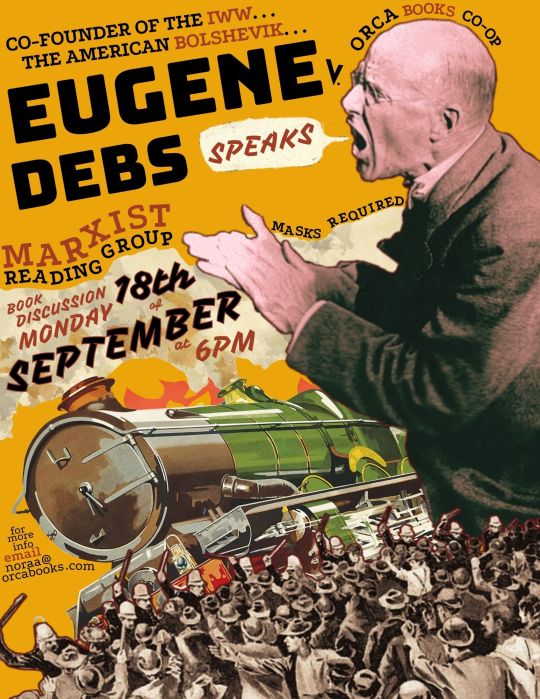
if you're in the Olympia area, my book group is today! come out and chat with us!!!!
3 notes
·
View notes
Text
3 notes
·
View notes


